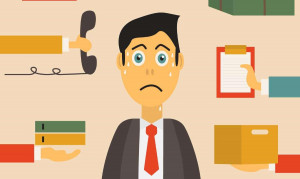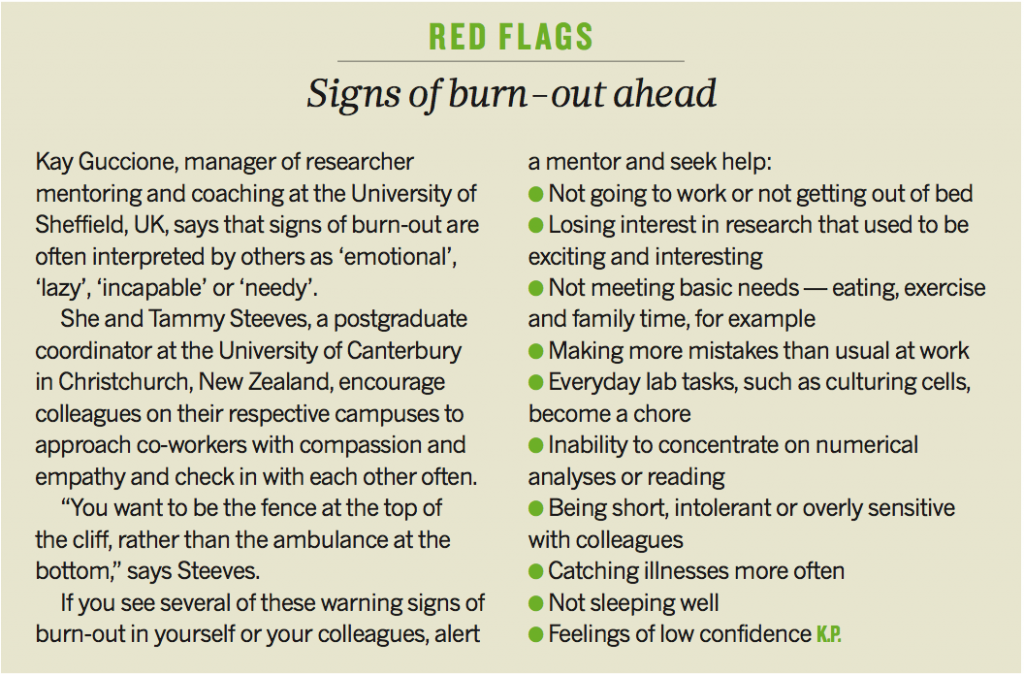By: Huri Mücahit The following blog post is a summary of, “Break or burn out” by Kendall Powell and “Burnout syndrome: five ways to keep it together” by Gaia Cantelli PhD students and postdocs work in some of the most rewarding positions, with the potential to truly be at the very cusp of the newest discovery - but all of this can come at a high personal cost. Often, graduate students believe that working hard is synonymous with working to the brink of exhaustion. From the extensive hours spent in the lab, obtaining inexplicable or negative results, and numerous additional responsibilities can combine to form a toxic environment for mental health. The phenomenon is in fact, so common, that numerous articles have been published on this very subject. Within this post, I will be reviewing two of these articles , both of which have been published in two of the most prominent journals in science: Nature Magazine and the American Society for Cell Biology.  The term “burn out” is defined as “a combination of overwhelming fatigue and a loss of motivation caused by chronic stress or frustration” (Powell, 2017). Since as many as one-third of graduate students are at risk for burnout, according to a study conducted in Belgium (K. Levecque et al. Res. Policy 46, 868–879; 2017), it is important to be aware of the warning signs, which are listed in the table below.
The term “burn out” is defined as “a combination of overwhelming fatigue and a loss of motivation caused by chronic stress or frustration” (Powell, 2017). Since as many as one-third of graduate students are at risk for burnout, according to a study conducted in Belgium (K. Levecque et al. Res. Policy 46, 868–879; 2017), it is important to be aware of the warning signs, which are listed in the table below.  As Kendall Powell mentions, it is important to treat both yourself and your peers with understanding; PhD programs are essentially marathons, and it is in all of our best interests to reach the finish line—aka the thesis defense—in a healthy state of mind. Ignoring the signs of burn out can threaten more than just the completion of our degree; it can lead to more serious mental and physical health issues such as depression. In the case where one can recognize these symptoms, what can we feasibly do to alleviate them? Gaia Cantelli offers some advice: first, pay attention to your body; check in and determine the difference between “being tired” and true fatigue. While it may be much easier to grab a candy bar and coffee to combat hunger and weariness, instead, put effort into eating healthier. You can simplify this process by having fruit and vegetables readily available so that you have no excuse. Secondly, although none of us ever seem to have the time, make sure to set aside time to obtain a full night of sleep. Exhaustion will only delay those breakthroughs we’re all looking for. Additionally, check in with your peers; we’re all in the same program so who else would be better to understand your struggles? It might be difficult to open up and discuss your experiences due to the fear of stigmatization and appearing “weak”, but you would be surprised by the number of students who might be in the same situation. There’s a reason that so many articles have been written on the subject! Furthermore, Rutgers University offers excellent counseling services on each campus, so don’t be afraid to take advantage of them. This is why they exist! You may feel ill-equipped to deal with these symptoms, but therapists and counselors most certainly are not. Remember, this is to help you get through a difficult, and temporary, period in your life. Finally, although it may seem impossible when you think of the sheer number of tasks that need to be completed, make sure to take breaks. If this thought seems frightening, take small breaks throughout the day during which you don’t discuss science with your peers or read a paper. You need to take effective breaks that clear your mind from science. When possible, make effort to spend time on a hobby, one that you know that you are successful at, in order to combat any demoralizing experiments or results. It might even be beneficial to minimize the amount of experiments you conduct, if only for a short period of time, just to restore your own well-being. As Cantelli states, “For a few short weeks, become the kid in school who does the minimum necessary to pass the class”. You can even use the twitter hashtag created by Kay Guccione, #takebreaksmakebreakthroughs to remind yourself of why these breaks are necessary. During these slower periods, the minimal stress may help you re-discover your passion for research and ultimately, help you reach the finish line.
As Kendall Powell mentions, it is important to treat both yourself and your peers with understanding; PhD programs are essentially marathons, and it is in all of our best interests to reach the finish line—aka the thesis defense—in a healthy state of mind. Ignoring the signs of burn out can threaten more than just the completion of our degree; it can lead to more serious mental and physical health issues such as depression. In the case where one can recognize these symptoms, what can we feasibly do to alleviate them? Gaia Cantelli offers some advice: first, pay attention to your body; check in and determine the difference between “being tired” and true fatigue. While it may be much easier to grab a candy bar and coffee to combat hunger and weariness, instead, put effort into eating healthier. You can simplify this process by having fruit and vegetables readily available so that you have no excuse. Secondly, although none of us ever seem to have the time, make sure to set aside time to obtain a full night of sleep. Exhaustion will only delay those breakthroughs we’re all looking for. Additionally, check in with your peers; we’re all in the same program so who else would be better to understand your struggles? It might be difficult to open up and discuss your experiences due to the fear of stigmatization and appearing “weak”, but you would be surprised by the number of students who might be in the same situation. There’s a reason that so many articles have been written on the subject! Furthermore, Rutgers University offers excellent counseling services on each campus, so don’t be afraid to take advantage of them. This is why they exist! You may feel ill-equipped to deal with these symptoms, but therapists and counselors most certainly are not. Remember, this is to help you get through a difficult, and temporary, period in your life. Finally, although it may seem impossible when you think of the sheer number of tasks that need to be completed, make sure to take breaks. If this thought seems frightening, take small breaks throughout the day during which you don’t discuss science with your peers or read a paper. You need to take effective breaks that clear your mind from science. When possible, make effort to spend time on a hobby, one that you know that you are successful at, in order to combat any demoralizing experiments or results. It might even be beneficial to minimize the amount of experiments you conduct, if only for a short period of time, just to restore your own well-being. As Cantelli states, “For a few short weeks, become the kid in school who does the minimum necessary to pass the class”. You can even use the twitter hashtag created by Kay Guccione, #takebreaksmakebreakthroughs to remind yourself of why these breaks are necessary. During these slower periods, the minimal stress may help you re-discover your passion for research and ultimately, help you reach the finish line.
iJOBS Blog